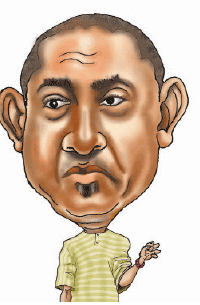I took a painful ride from Ihiala to Owerri. I had a breakdown that would take days to remedy. From Ihiala to Owerri is about 50 kilometres. That short trip said a lot of the increasing lack of social responsibility and sanity in our public transport sector.
A band of low human spirits known as conductors gave me the creeps. They are hawks after prey. No culture of decent interchange characterises their attitude to paying passengers. No decency in conduct is evident among them. Little culture of cleanliness is discernible as they flaunt their body on well-dressed passengers. Feud between them and their passengers is a norm.
The drivers, who man the vehicles, are fixated on daily returns that nothing else counts, not even the safety of their dead weight in humans and cargo. The life savings of a rural woman buried in a sack of stockfish dropped while an unwary driver hurtled through space. Oncoming drivers alerted our fixated driver. The half sane conductor had to run back one kilometre to recover the woman’s investment. I shudder in thought that perhaps all these happened to brief me on the human condition in Igboland.
The agents of transporters over-speak their passengers and howl at them with slightest provocation in the direction of haggling rates that have no discernible tariff structured into time and distance between embarkation and disembarkation.
The 14-seater Hiace bus was re-fabricated disingenuously to accommodate 18 passengers, no matter their size. It is evident that none of the automobile engines of the three different buses that were our un-programmed ordeal was road-worthy enough to provide seamless transportation function from pick-up to drop-off. It was regular with nearly all passenger vehicles, since three different vehicles showed the same features.
It was difficult to squeeze into the back seat. I had little legroom after a young man took the seat in front of me. His seat having been yanked off, he sat on the curved panel provided over the wheel below. He got the same fare as those comfortably seated (if comfortable could be ascribed to the inglorious discomfort of a trip). The bus was simply so tight that it was difficult to change sitting position when a side of the ass got numb.
The young bus conductor was rude and nasty. He hollered with crudeness to passengers in demanding his tariff. He just poked his hand at his victim and said “ego gi” (your money). I muffled my irritation and just watched. I had paid N200 without a haggling chance. I just had to get home before dark.
A friend of the driver boarded the vehicle in motion after about four kilometres. Police checkpoint was close. The hanger-on did not have a seat. He incommoded a paying commuter by hanging loose, without apology.
The bus screeched to a halt. Brake pads told a story of wear and a discomforting hum indicated paucity of grease in moving parts. Yet as soon as the frugal door of the bus slammed shut, the driver thundered off as if he was in an escape bid to avoid disaster. The young free rider made a palm sign of abuse (waka) to the military police at checkpoint and they swore to make mincemeat of the culprit.
The free rider dropped off while our vehicle was in motion upon sighting the revenge mission. The conductor who shared green shirt colour with the abuser became a victim by natural law. He was whisked off, and upon being frisked, a handful of marijuana was found in his pocket. The soldier humoured with his find. He was stripped naked and flogged, and the transport fare we paid ended there.
We had only gained 10 kilometers from embarkation. The cogent reason given by the driver was that the day’s proceeds were with his conductor and our journey just had to terminate there. No refund. No compassion. None was contemplated. We who were victims of callous indifference just melted away in search of alternative. Woe betide the traveller who had marginal resources.
A foreigner would consider himself or herself in a searing hot passage to hell to travel in Igboland. The gates of hell could not be far away. What is the watershed for this madness? Perhaps the lack of formal education is the culprit. What about informal education? Surely this will be required in huge doses if the Federal Road Safety Commission (FRSC) could take its mandate seriously.
The erstwhile Corps Marshall, Osita Chidoka, has garnered resources enough to bulldoze his way into ministerial appointment, leaving a poorly-oriented corps behind without appropriate tools for contributing to positive evolution of his corps. The sad reality is that he will soon plan for governorship. What a pity for Ndigbo and Nigeria!













